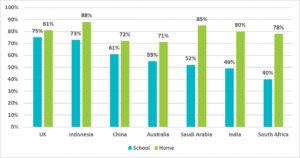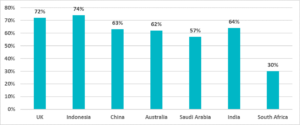Almost half of children are not always using soap when washing hands at school, new global survey finds
July 1, 2020
Leading hygiene experts are stressing the importance of effective hand hygiene measures and education in schools as children begin returning to educational settings following the COVID-19 pandemic.
The calls follow a new global survey conducted by The Global Hygiene Council (GHC) highlighting that almost half (42%) of children aged 5-10 are not always using soap when they wash their hands at school. The survey assessed primary school children’s hygiene awareness and habits across seven countries during COVID-19 and, in all countries, usage of soap was higher at home than in school settings.

Figure 1 – % children (5-10 years) always washing their hands with soap at school and home settings; Source – Global Hygiene Council
At schools, less than half of children (44%) said that someone ensures they always wash their hands prior to eating, with the vast majority (71%) stating this happens at home.
Commenting on the survey findings, Assistant Professor of Medicine Sumanth Gandra MD, from the Division of Infectious Diseases at Washington University School of Medicine in St. Louis explains, “As children slowly begin returning to schools around the world, the focus on improved hygiene should not just be a short-term measure. Whilst COVID-19 has increased public awareness of the importance of hand hygiene in stopping the spread of respiratory infections, basic hygiene measures such as handwashing are also essential in preventing the spread of common illnesses including gastrointestinal infections, such as diarrhoea.”
The experts stressed that the first step towards ensuring that these measures are adhered to is by adequately resourcing schools with soap. On average, only 60% of children stated that soap was always available in school settings, with one in 10 stating that soap was never available.

Figure 2 – % children stating that soap is always available at their school setting; Source – Global Hygiene Council
Schools provide multiple opportunities for the spread of infection and adopting a targeted hygiene approach offers a way to maximise protection against infection at the times and areas where there is the greatest risk of infection1. According to a recent paper published in the American Journal of Infection Control1, improved everyday hygiene practices, such as hand-washing, reduces the risk of common infections by up to 50% and the need for antibiotics by up to 30%.
Studies in school settings with appropriate hand hygiene, in combination with surface disinfection, have indicated a positive impact on illness rates2-5. Professor Sally Bloomfield from the London School of Hygiene and Tropical Medicine comments, “Targeted hygiene means focusing hygiene practices in places and at times – known as ‘risk moments’ – when harmful microbes are most likely to spread. The key risk moments at schools include food handling, using the toilet and touching surfaces frequently touched by others.”
“Whilst the majority of children may know that they should be washing their hands, many are not actually putting it into practice, so there is a clear gap in educating them about the importance of handwashing”, adds Dr. Gandra. “It is essential that healthy hygiene habits, such as washing hands for 20 seconds with soap and water, are ingrained into the next generation to help prevent the spread of future outbreaks and to protect families from other common infections.”
References
- Maillard J, Bloomfield SF, Courvalin P, Essack SY, Gandra S, Gerba CP, Rubino JR, Scott, EA. Reducing antibiotic prescribing and addressing the global problem of antibiotic resistance by targeted hygiene in the home and everyday life settings: A position paper. American Journal of Infection Control. 2020.
- Uhari M, Mottonen M. An open randomized controlled trial of infection prevention in child day-care centers. Pediatric Infect Dis J. 1999;18:672–677.
- Ban HQ, Li T, Shen J, et al. Effects of multiple cleaning and disinfection interventions on infectious diseases in children: a group randomized trial in China. Biomed Environ Sci. 2015;28:779–787.
- Krilov LR, Barone SR, Mandel FS, Cusack TM, Gaber DJ, Rubino JR. Impact of an infection control program in a specialized preschool. Am J Infect Control. 1996;24:167–173.
- Sandora TJ, Shih MC, Goldmann DA. Reducing absenteeism from gastrointestinal and respiratory illness in elementary school students: a randomized, controlled trial of an infection-control intervention. Pediatrics. 2008;121: e1555–e1562.